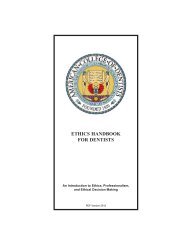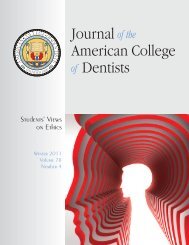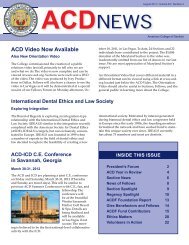JACD 71-4 - American College of Dentists
JACD 71-4 - American College of Dentists
JACD 71-4 - American College of Dentists
- No tags were found...
Create successful ePaper yourself
Turn your PDF publications into a flip-book with our unique Google optimized e-Paper software.
Harold Slavkin, DDS, PhD, FACD<br />
Abstract<br />
Science has become complex. Its success<br />
is increasingly becoming a matter <strong>of</strong><br />
collaboration based on established<br />
infrastructures and pr<strong>of</strong>essional norms in<br />
response to environmental challenges.<br />
Leadership in such situations means<br />
organizing the genius inherent in great<br />
groups. Three examples–the Manhattan<br />
Project, mapping the human genome, and<br />
rapidly understanding the nature <strong>of</strong> the<br />
SARS virus–are analyzed, showing a trend<br />
away from the individual scientist to a<br />
model based on simultaneous competition<br />
and collaboration.<br />
Journal <strong>of</strong> the <strong>American</strong> <strong>College</strong> <strong>of</strong> <strong>Dentists</strong><br />
Leadership in Research: Organizing Genius<br />
begin responsibilities,”<br />
William Butler Yeats wrote.<br />
dreams<br />
“In<br />
Nowhere is this demonstrated<br />
more vividly than in the life and times <strong>of</strong><br />
effective leaders. Leaders dream, organize<br />
genius, advance research problem<br />
solving, and produce results. A few years<br />
ago, my colleague and friend Warren<br />
Bennis (Distinguished Pr<strong>of</strong>essor <strong>of</strong><br />
Business Administration at the University<br />
<strong>of</strong> Southern California) reminded me<br />
that all humans possess a passion to<br />
understand and predict the future, and<br />
that a “leader” takes on the responsibility<br />
for molding and shaping the possibilities<br />
with a tangible dream <strong>of</strong> the future. For<br />
Warren, after consulting for multinational<br />
companies and governments around the<br />
world, the conclusion is that futurists are<br />
leaders and leaders are futurists. Warren<br />
asserts that leadership attempts to identify<br />
the future and to grasp events yet to<br />
come (Bennis, 2000). He also asserts<br />
that leaders attempt to control what is to<br />
come through a social invention termed<br />
“forward planning.” Dean Art Dugoni<br />
has been dreaming, leading, and taking<br />
responsibility at the University <strong>of</strong> the<br />
Pacific for many decades.<br />
President John F. Kennedy reflected:<br />
“The problems <strong>of</strong> the world cannot<br />
possibly be solved by skeptics or cynics<br />
whose horizons are limited by the<br />
obvious realities. We need men who<br />
can dream <strong>of</strong> things that never were.”<br />
Ronald Reagan said: “While I take<br />
inspiration from the past, like most<br />
<strong>American</strong>s, I live for the future.” Martin<br />
Luther King, Jr., dreamed <strong>of</strong> a future as<br />
National Leadership Symposium<br />
exemplified in his famous utopian<br />
statement “We shall overcome someday.”<br />
King envisioned a better tomorrow that<br />
could be obtained through an arduous<br />
struggle toward victory.<br />
I suspect we all would agree that<br />
there are all too few originals left in<br />
<strong>American</strong> society today—men and<br />
women who speak with a unique voice<br />
and who can <strong>of</strong>fer an unconventional<br />
perspective with bracing authenticity.<br />
Art Dugoni, like his beloved California, is<br />
an undisputed original. He grew up<br />
within a large Italian family in the<br />
shadow <strong>of</strong> the Depression and World<br />
War II, and he experienced and was<br />
pr<strong>of</strong>oundly influenced by the remarkable<br />
events <strong>of</strong> the second half <strong>of</strong> the twentieth<br />
century. From this “powerful crucible,”<br />
the term used in the analysis <strong>of</strong> Warren<br />
Bennis and Robert Thomas (2002), a<br />
major leader in the oral health pr<strong>of</strong>essions<br />
has emerged. Art’s voice is one<br />
that should be heard by all those who<br />
would aspire to lead thoughtfully and<br />
effectively in our own time.<br />
Organizing the Genius in<br />
Great Groups<br />
My goal in this essay is to explore the<br />
opportunities <strong>of</strong> leadership for scientific<br />
research in the twenty-first century. In<br />
my essay, I envision science as the fuel<br />
Dr. Slavkin is dean <strong>of</strong> the<br />
University <strong>of</strong> Southern<br />
California School <strong>of</strong> Dentistry<br />
and former director <strong>of</strong> the<br />
National Institute <strong>of</strong> Dental<br />
and Crani<strong>of</strong>acial Development.<br />
slavkin@hsc.usc.edu.<br />
33





